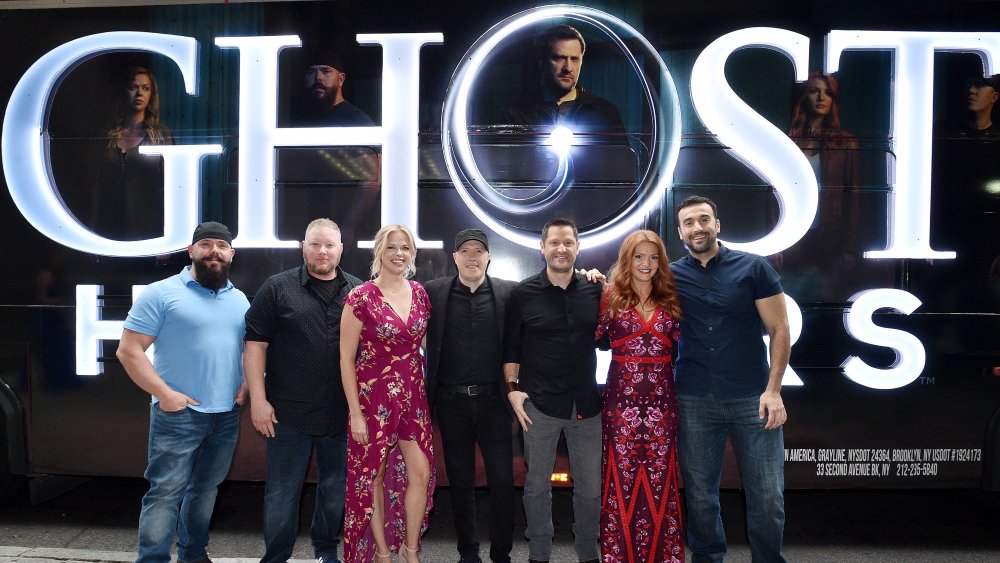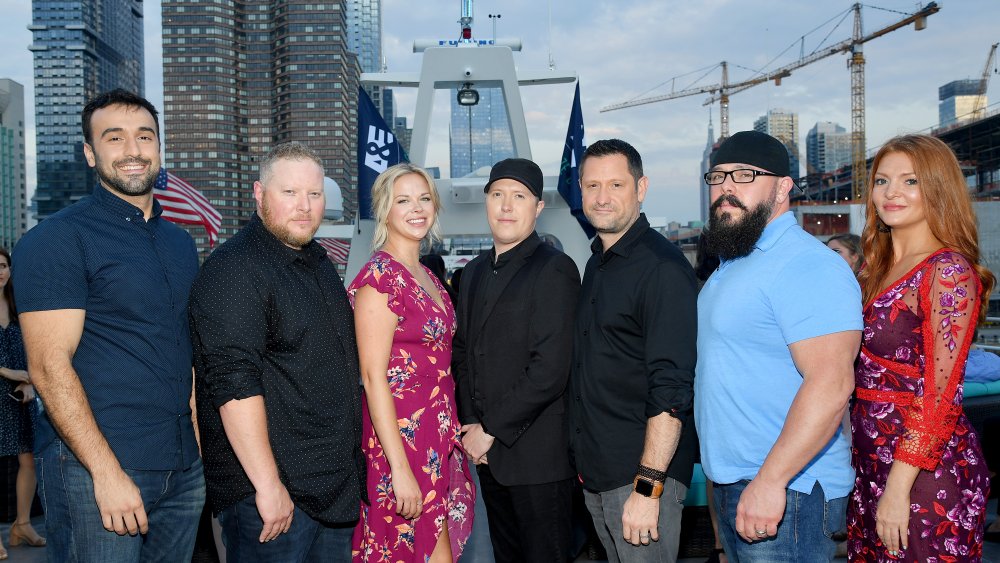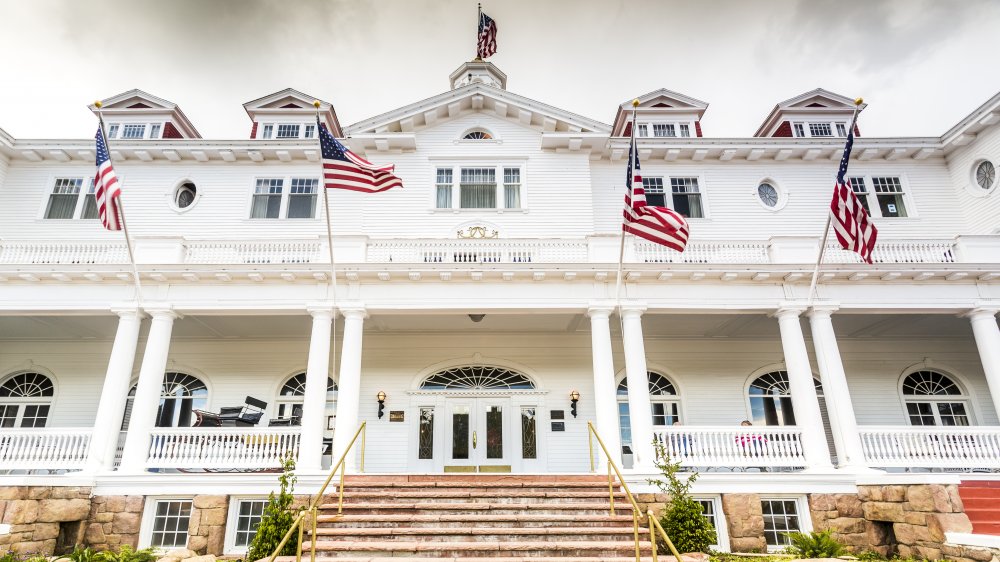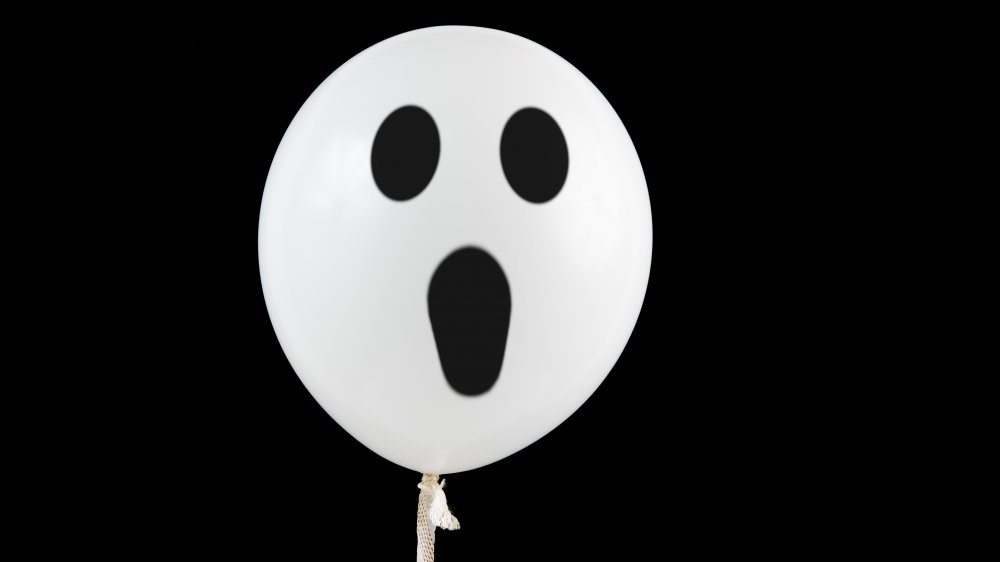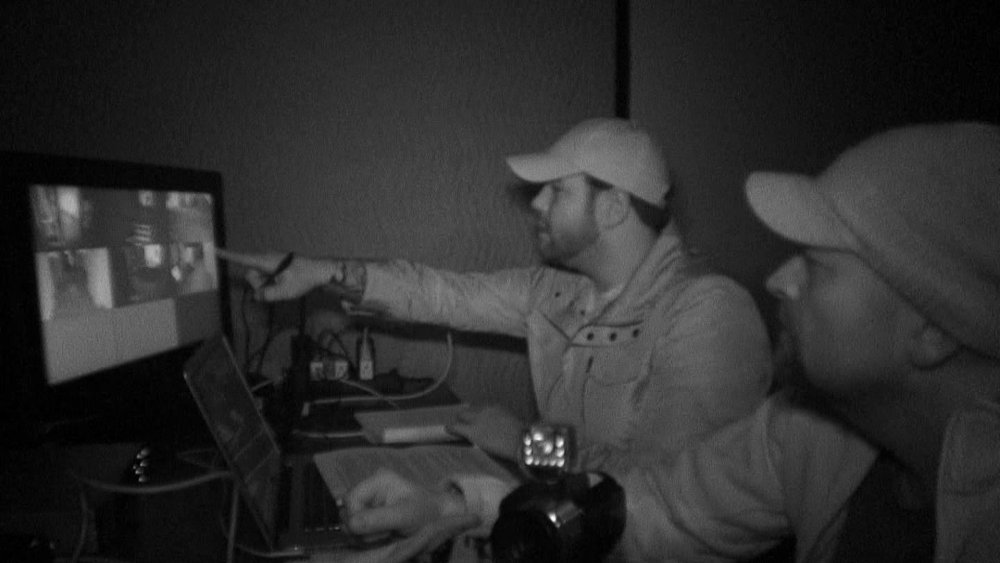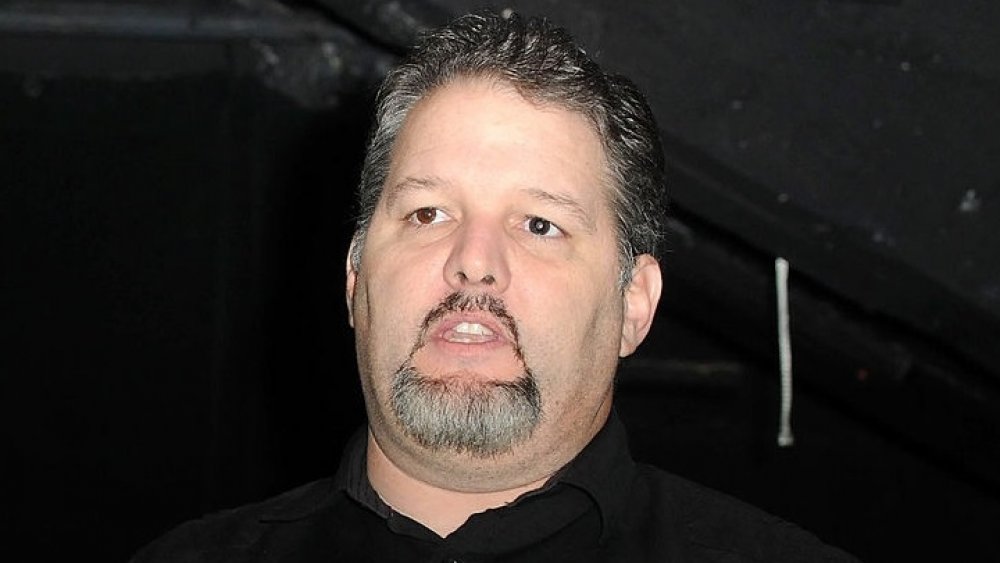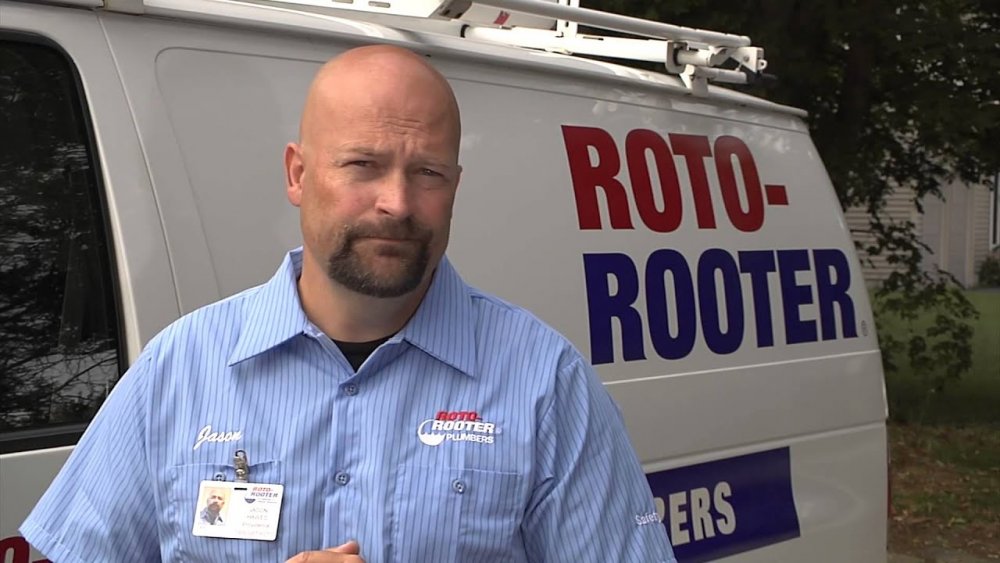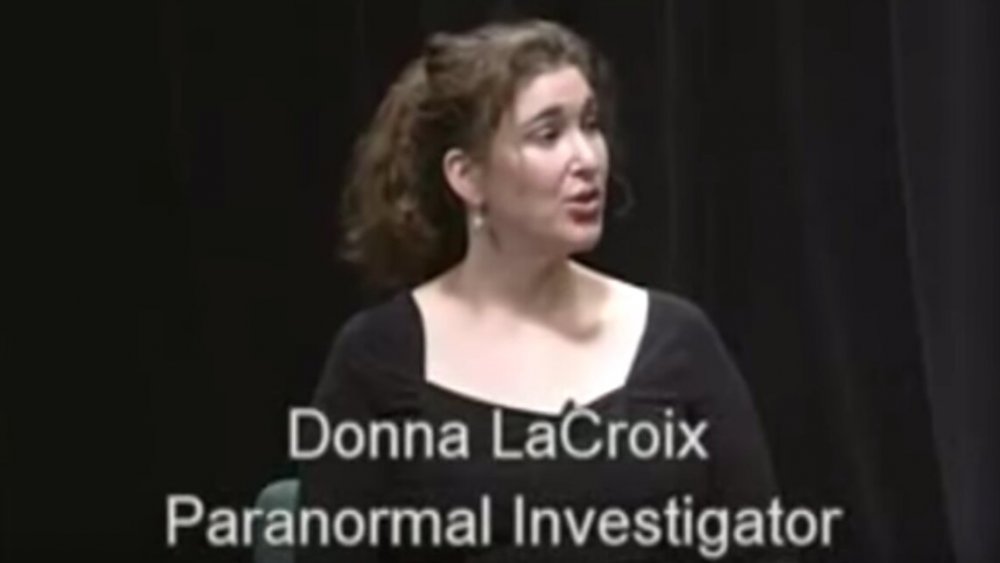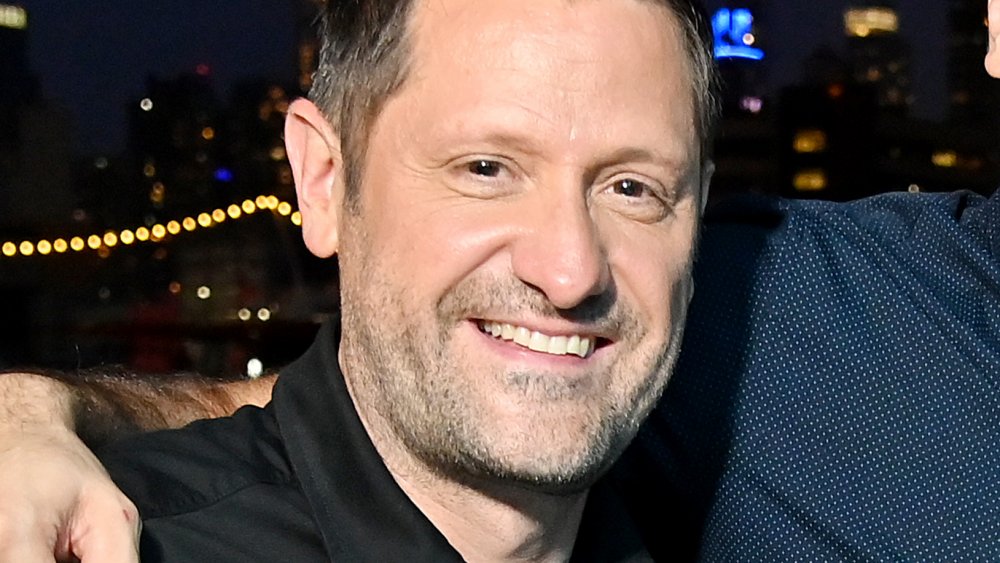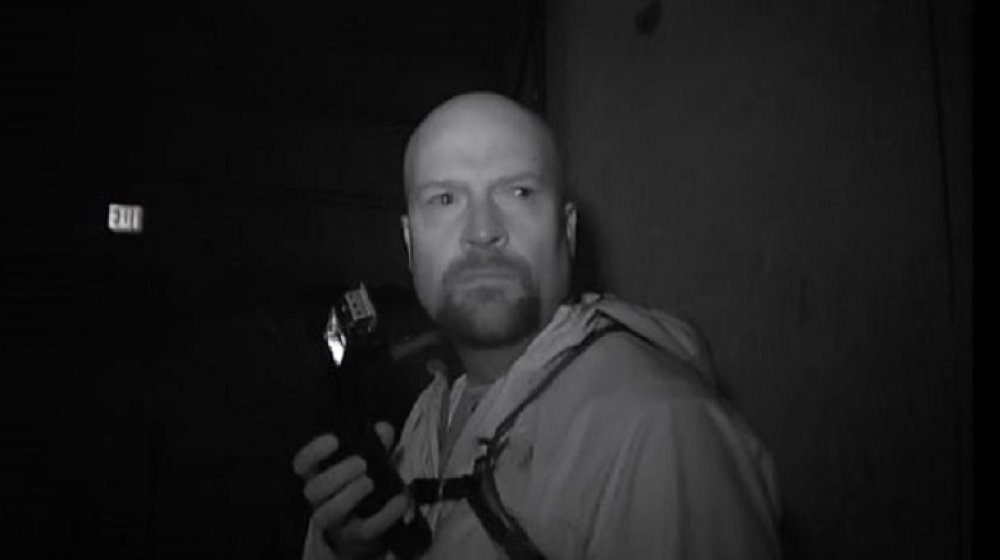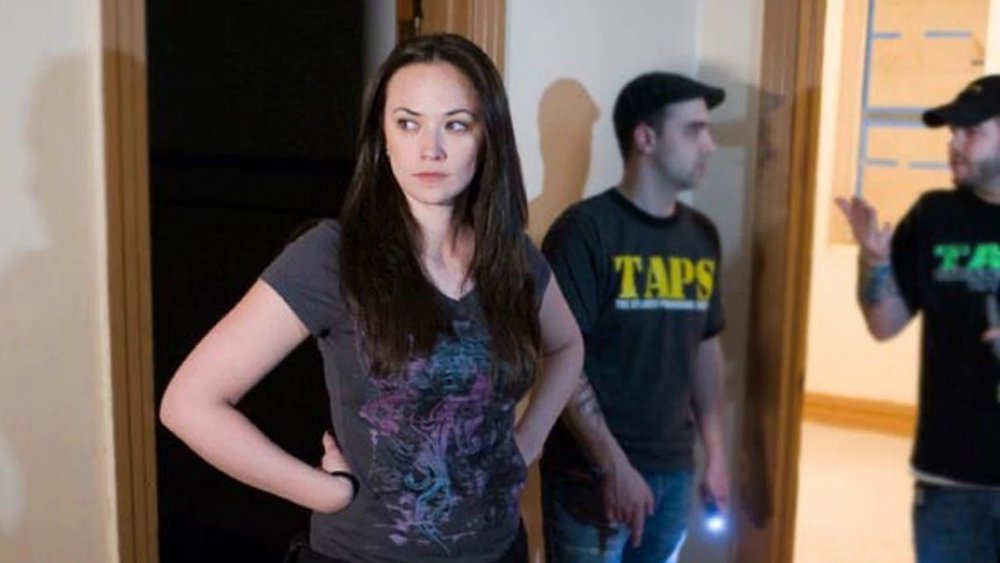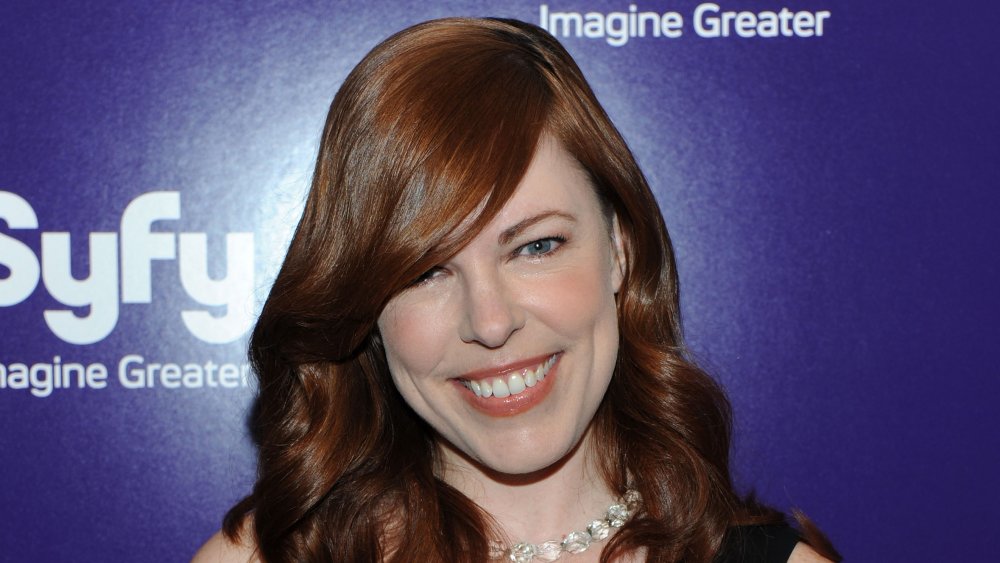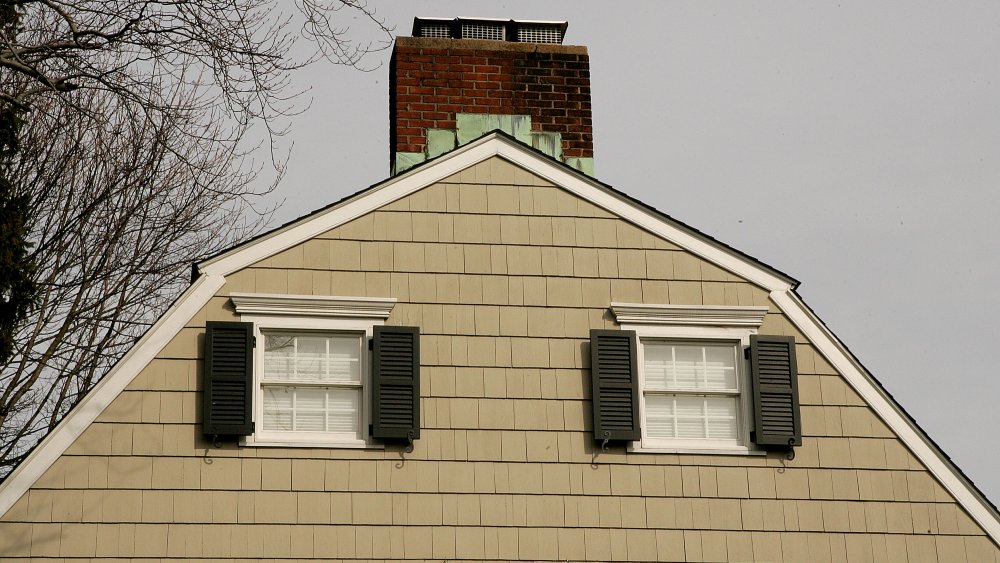The Untold Truth Of Ghost Hunters
Ghost Hunters, an unscripted paranormal investigation series that saw its cast, well, hunt ghosts, first debuted on Sci-Fi (later named Syfy) in 2004, and ran for 11 successful years on the channel. During its heyday, the show was bringing in up to three million viewers per episode, but hit some bumps down the road. In 2012, one of the show's main investigators, Grant Wilson, announced that he'd be leaving the show to focus on his personal life. In 2016, co-investigator Jason Hawes made an announcement of his own, via his Facebook page, stating that Ghost Hunters would be parting ways with Syfy as a whole.
In 2019 A&E revived the show (sans Hawes) with Wilson heading up a new team of investigators. This stirred up a great deal of excitement within the paranormal fan community, even more so when they announced a 13th season for 2020. So, let's gather together under the glow of our ghost detectors (you have one, don't you?) to do some investigating of our own. How did this whole thing get started? Has the team actually discovered evidence of the paranormal, or has it all been one big con? And what really went down between the original Ghost Hunters crew and Syfy? This is the untold truth of Ghost Hunters.
Ghost Hunters started as a paranormal support group
Jason Hawes, former co-lead investigator for Ghost Hunters, founded a paranormal support group called Rhode Island Paranormal Society in 1990. In his book, Ghost Hunting: True Stories of Unexplained Phenomena from The Atlantic Paranormal Society, Hawes writes about R.I.P.S saying, "It wasn't a ghost-hunting organization ... at least not at first. It was more of a support group. I was trying to connect with people who had gone through experiences similar to mine ..." Those experiences included seeing lights, mist, "see-through animals and full-body human apparitions." They terrified him, but the support group and, bizarrely, eating green olives, helped him feel less crazy.
During the early days of R.I.P.S, Hawes received a call from someone offering to improve their website for free. That person turned out to be Grant Wilson. After a period of working together, Hawes and Wilson wanted to develop a more rational approach to investigating paranormal activity, something that relied less on emotions, and more on science and logic. The duo formed The Atlantic Paranormal Society (T.A.P.S.), which was the start of what would eventually grow into the Ghost Hunters made famous on television.
Come play with us, Danny
In 2009, the novelist and filmmaker Kamran Pasha was lucky enough to tag along with the Ghost Hunters team for a three-day investigation of the Stanley Hotel in Colorado, a famous haunted place you can actually visit. Pasha wrote about her experience in a Huffington Post article, describing what they encountered in the supposedly haunted hotel, which is so creepy that writer Stephen King used as inspiration for his novel The Shining.
While investigating Room 1302, known as one of the most haunted areas on the property, Pasha participated in an electronic voice phenomena (EVP) session and claims to have heard a male voice say, "I hate you. I'm angry." Frightened, and curious, she asked the spirit, "Are you trapped here, or free to leave?" She claims that when they played the tape back the same male voice was heard very clearly replying, "Free to go."
Pasha and the rest of the investigators then moved on to Room 401, which is reportedly haunted by the spirit of Lord Dunraven, a former local ladies' man who, as the stories go, lingers behind in the spirit realm pinching unsuspecting ladies' actual behinds whenever he has the opportunity. No butt pinching took place during her visit, but another female investigator claims to have heard a woman's voice in the closet say, "Lift your face." The experience as a whole was proof enough for Pasha that ghosts do indeed exist.
Hunting ghosts on Ghost Hunters is surprisingly low-tech
In addition to the standard electromagnetic field (EMF) meters and EVP recorders, Ghost Hunters investigators use a wide variety of unconventional items to detect paranormal activity. Among the more unusual items are helium balloons, which Grant Wilson says are used in cases where property owners experience cold spots thought to be made by nearby ghosts. Half-deflated balloons can be put into play to show that, no, there's just an actual draft in the home.
A few other items in their toolbox that you wouldn't expect to see include crepe paper, which is sometimes used as a cheap motion detector, and talcum powder, which Wilson says ghost hunters sometimes sprinkle on the ground to pick up footprints left behind by creeping apparitions. Steve Gonsalves, former lead investigator and case manager for Ghost Hunters, recommended some of his favorite tools of the trade in a gear guide for Roadtrippers, and put a good old fashioned flashlight at the top of the list. Just goes to show that it doesn't take a lot of money to hunt ghosts.
Is Ghost Hunters all smoke and mirrors?
There's plenty of evidence Ghost Hunters is fake, and always has been. While filming at the Overbrook Asylum for the 2009 episode "Garden State Asylum," a member of the crew left behind what appeared to be staging notes.
Further first-hand evidence is found in a Reddit thread of people involved in various "reality" shows. In it, a user going by the name BosskHogg says "I was on set for a filming of Ghost Hunters in Buffalo. On the show, they are 'investigating' an upper level of the Buffalo Central Terminal when they hear a 'disembodied' voice say 'Get out!' It was the property manager on a lower level yelling at some homeless people to clear out. Everyone knew it was him, but it somehow made it in the show as an 'unexplained' event." It's Reddit, so take that "proof" with grain of salt, but it definitely seems plausible.
Even the equipment used on the show has been called into question. An in-depth article by The Atlantic details how EMF meters, specifically the K-II meter frequently used on Ghost Hunters, are "erratic, prone to false positives, [and] easily manipulated." EMF meters supposedly "detect electromagnetic fields, measuring them with a bright LED array that moves from green to red depending on their strength." The readings spike when in proximity of something as simple as wiring in the walls of a building, which isn't accurate, but great if you want "evidence" of ghosts for your TV show.
A Ghost Hunter was fired for using homophobic slurs
Britt Griffith, an investigator for Ghost Hunters, did a guest appearance on the radio show Rain City Paranormal in 2010, and it was a disaster. Griffith verged on racism when, in response to being asked what profession he wanted to pursue as a child, stated he almost became a police officer, but decided it wasn't for him after the Rodney King attack in 1991, implying the cops were right to beat King. "I was actually in the academy, my dad was a cop, cops were in my family, and then Rodney King happened, and just when I was finishing up all of my stuff and my applications from the academy, I said you know, I don't think this is for me," Griffith said during the show. "Well, the way I look at it ... it's not whether you're right or wrong, it's how you look on video tape."
He also let his employers, fans, and decency in general down by saying people who live on the East and West coasts are "anti-gun p*ssy f*gg*ts."
Shortly after this radio appearance, Griffith's bio was absent from the show's Syfy page. Ryan Buell, an out and proud bisexual known best as the onetime host of Paranormal State, wrote a post on his blog after hearing Griffith's comments and said "Props to SyFy for firing Britt Griffith for his hate speech! There are gay children dying in this country because of hate."
Many Ghost Hunters have side jobs
If the ghost sleuthing business suddenly dried up, many of the investigators on Ghost Hunters, both past and present, have side jobs they could rely on to keep food on their tables.
The New York Times reports both Jason Hawes and Grant Wilson are former Roto-Rooter plumbers, so they are the ones to call if your pipes are full of tormented souls. Kristen Luman, the new co-lead investigator for A&E's Ghost Hunters re-boot, is a licensed hypnotherapist. Former tech manager Steve Gonsalves is a film producer, even working alongside Guillermo Del Toro to create the horror short "Captured Bird." And Daryl Marston, another new co-lead investigator on the re-boot, is a former firearms instructor and a contractor.
Looking at that list, compiling a team that knows how to properly fire a gun, fix a leaky pipe, patch up the wall when its fixed, film the whole process, and then hypnotize you into thinking the whole mess never happened, sounds like a pretty well-rounded crew.
Former Ghost Hunters have spoken out about the show — and not kindly
Donna Lacroix, a case manager and investigator for Ghost Hunters and Ghost Hunters International, has been very vocal in expressing her distaste towards the show, as well as her former cast members. Calling in to a radio program called "Ghost Divas" in 2009, Lacroix said that her contract while on the show was so bad she nearly went bankrupt, plus everyone was out to stab each other in the back, and there was a staging crew for episodes.
As for her opinion about Ghost Hunters leads, Grant Wilson and Jason Hawes, she referred to them as "the kings" during her call, going so far as to say they treated tech manager and investigator Brian Harnois like their "whipping boy" to the point of mental abuse. In 2012, Harnois scared his fans, not to mention his friends and family, when he went missing after posting what appeared to be a suicide note on his Facebook, which has since been deleted.
Grant Wilson's departure from Ghost Hunters was a sign of trouble
In 2012, Grant Wilson, co-lead investigator for Ghost Hunters, announced during an episode that he'd be leaving the show at the end of his eighth year to focus on other aspects of his personal life. In a recent interview with Den of Geek, Wilson says that at the time he felt as though the show had started to rely on gimmicks, and that they were "kicking a dead horse," which ultimately led to his decision to leave the show.
But in 2019, A&E picked up Ghost Hunters for a reboot, with Wilson returning to head up a whole new team of investigators. This thrilled fans, while also causing a bit of confusion. What prompted Wilson to change his tune? In an interview with TV Insider, Grant said "I never stopped investigating the paranormal ... My youngest is about to graduate from high school, and he's got it all figured out, so why not get back into it?" Makes sense. But, wait, so why didn't his previous partner in ghosts, Jason Hawes, come back as well?
A feud in Ghost Hunter's upper ranks
Looking at the chain of events for Ghost Hunters, specifically those having to do with key members leaving the show, there's a few mysteries to puzzle over. Why is it that Grant Wilson was the first to announce he was leaving, then returned for the A&E reboot in 2019, but co-lead investigator Jason Hawes rode the sinking ship to the very end of its run on Syfy, and stayed gone?
You'd think that when A&E picked the show back up for new seasons, and Wilson announced he'd be returning, Hawes would have jumped on board as well, but that wasn't the case. Instead, Hawes heads an entirely different show, with a very similar name, Ghost Nation, which debuted on the Travel Channel in October 2019.
Although Wilson and Hawes have both stuck with their stories that, when it came to their working relationship, everything was rosy, it's hard not to wonder if that's as true as they make it seem. Shortly after Grant announced he was leaving Ghost Hunters in 2012, he and Dawes listed Spalding Inn, a New Hampshire property they co-owned, for sale. Hawes spoke about Grant's initial split during an episode of Beyond Reality Radio, which he co-hosts, saying "anytime a cast member leaves there is a change in the dynamics of the team – sometimes good, sometimes not good ..." If there was ever a feud here, Hawes and Wilson are playing it cool.
Ghost Hunters finally went too far
"With heavy heart we want to inform everyone that we are choosing at this time to end our relationship with SyFy channel." That's what Jason Hawes posted to Facebook on June 7, 2016, but further insight points more towards a cancellation than a voluntary departure. During a speaking engagement in Vermont in 2015, Kris Williams (pictured), a former case manager and investigator for Ghost Hunters, and later for the spin-off Ghost Hunters International, said that a dip in ratings, and the subsequent envelope-pushing stunts in a desperate effort to bring them up again, led to Ghost Hunters International getting cancelled.
In an episode of GHI titled "Sacrificed Mayan Spirits: Belize," cast member Susan Slaughter cut herself during a bloodletting ritual and Williams thought that the stunt was too much. After expressing reservations, pleading for the episode not to air, she quit when her requests were ignored.
Knowing this, it would make sense that Ghost Hunters, which experienced a ratings dip of its own, was next on the chopping block. In 2015, the year before Hawes' announcement, the show was averaging ratings of just 1.7 million viewers, a significant drop from the three million it brought in during earlier seasons. And Syfy was going in a different direction, towards mostly scripted television. Within a few years only one paranormal show, Paranormal Witness, remained.
Ghost Hunting is women's work
The women of Ghost Hunters have proven themselves more than capable of holding their own. One woman in particular, Amy Bruni, an investigator for the show from 2008-2014, sleuthed spooks while pregnant. "If we're local, I'll investigate until I go into labor–as long as I'm close to the hospital, it's fine," Bruni said in a 2013 interview with Glamour.
A proclivity for the paranormal has fallen within the wheelhouse of women for many years now, believe it or not. When the director Paul Feig made the announcement in 2014 that he'd be making a new Ghostbusters film, with an all female cast, the misogynistic backlash was immediate. Bruni, as one would guess, had a lot to say on the topic, and admitted in a 2015 Huffington Post article that at first she thought the angle was "a stunt," but gave it more thought and concluded it was actually a perfect way to add to the arch of the films without attempting to replace the original cast. She also chimed in with some pearls as to why women have every right to be ghost hunters, or fans of the paranormal in general.
"I would say the paranormal field strongly skews female," Bruni said to Huffington Post. "When you attend a paranormal convention, you've usually got 75 percent ladies to 25 percent men ... However, on television, the field is strongly represented by men and frankly, it's just not accurate."
Jason Hawes thinks Amityville was a hoax
Throughout the years, Jason Hawes has spoken about the infamous Amityville haunting in such a way that leads one to believe he doesn't believe it at all. In an interview with the blog Geek Mom in 2015, the interviewer asks Hawes what location he would investigate, if he had unlimited access, and he said "to answer this, I would need a time machine ... I would want to see what truly happened at the Amityville house. I know the claims and have studied the case for many years. I spoke to George many times before he passed and found stories that ... never seemed to match the previous story. I just believe there was way too much hype and not enough truth to it."
Furthering evidence of his doubts on the matter, Hawes shared a video of the home's patriarch, George Lutz, discussing the Amityville events to his Facebook page in 2018 with the caption "In this video, George Lutz talks about his and his families experiences at the Amityville house. Take a listen and tell me, your thoughts. "Real or hype?"' Seems like Hawes had long since answered that question for himself.
